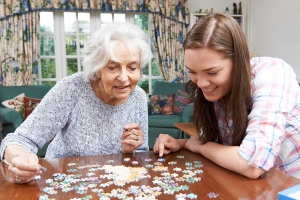Feeling a sense of purpose or meaning in life is associated with a 19% reduced rate of clinically significant cognitive impairment later, according to findings from a review of evidence led by researchers at University College London (UCL).
The UCL researchers examined several positive psychological constructs (e.g., maintaining a positive mood, being optimistic, having a sense of life purpose) to determine if these constructs have a significant association with reduced risk for dementia and other cognitive impairment in later life.
The results showed that having purpose and meaning in life were key factors consistently associated with reduced risk of dementia years later:
- Among people who had higher purpose or meaning in life, there was significant association with a reduced risk of multiple cognitive impairment outcomes, including dementia and mild cognitive impairment.
- Having a sense of purpose, most notably, was associated with a 19% reduced rate of clinically significant cognitive impairment. This finding—reduced risk for cognitive impairment—did not apply to other positive psychological constructs, such as having a positive mood state.
For this study, the UCL research team conducted what is known as a systematic review and meta-analysis, which involves and in-depth approach to pooling and analyzing data from multiple studies. The researchers gathered evidence from nine previously published studies, yielding data from 62,250 older adults (age 50+) across three continents. This makes the findings quite meaningful because they have relevance across different demographics.
Meaning in Life: How Does it Protect the Brain from Impairment?
One theory about how purpose and meaning, as well as other positive psychological factors, may protect against cognitive decline has to do with the physiological effect that positive mood and resiliency has in the body, including the brain.
Positive mood promotes a state of balance (homeostasis) in the body. This reduces the circulation of stress hormones and other chemicals that are known to increase inflammation in the cells and tissues, Inflammation, which causes damage to cells and can alter physiological function, is a known underlying factor in many disease processes, including Alzheimer’s Disease and heart disease among others.
Having a sense of purpose in life seems to promote positive mood, which supports resiliency from stressful events; in turn, this reduces inflammation in the brain—both of which are linked with reduced risk of dementia.
Reinforcing the positive psychological effects that come with having a sense of purpose is the fact that, when people feel their life has meaning and purpose, they are more likely to engage in activities that support their health: exercising, socializing with peers, doing volunteer work—all of which may protect against dementia risk.
The researchers suggest that prevention programs for people at-risk for cognitive impairment and dementia should prioritize activities that help bring purpose and meaning to one’s life. Staff who work with older adults can devote programming time to helping the elder identify what is important them, what their values are, and how they might act in alignment with these priorities and values. The researchers suggested “taking small steps.” For example, if an elder values “education for all,” they could benefit from volunteering as a literacy coach or as a reading buddy in a local school.
Everbrook Senior Living Residents Find Meaning, Purpose in Ageless Communities
The Everbrook philosophy is that, in later life we become ageless: As we fully accept our health and functional status, and that of our friends and neighbors, we recognize how interdependence helps to preserve independence. Our staff design and deliver activities that are suitable for all residents without regard to their functional status (independent living, assisted living, memory care). It is very important to all of us at Everbrook—and to our residents—that there is mutual respect and support among residents and that all residents experience belonging.
To promote a sense of belonging, meaning, and purpose (as suggested by the research study), our staff plans activities that enrich intellectual, social, and emotional wellbeing and help to give residents a sense of control over their aging process. Our interdisciplinary team is well-trained to deliver stage-appropriate activities that are matched to a resident’s functional and cognitive abilities. We employ adaptive methods of communication to evoke and sustain a positive emotion throughout the day.
Our Wellness 4 Later Life™ program model encompasses seven dimensions of wellness: physical, spiritual, emotional, social, intellectual, vocational, and environmental, as are advocated by the International Council of Active Aging. We help our residents discover what is significant in their life, now. Residents, with as much support as is needed, identify ways to add meaning/purpose to their self-care, in their activities at Everbrook, and in the community beyond Everbrook.
Original Research
“Positive psychological constructs and association with reduced risk of mild cognitive impairment and dementia in older adults: A systematic review and meta-analysis” by Georgia Bell et al. Ageing Research Reviews. The study was supported by the Alzheimer’s Society
Supporting Research, Resources
Dockray, S., & Steptoe, A. (2010). Positive affect and psychobiological processes. Neuroscience and biobehavioral reviews, 35(1), 69–75. https://doi.org/10.1016/j.neubiorev.2010.01.006
Ong, A. D., Mroczek, D. K., & Riffin, C. (2011). The Health Significance of Positive Emotions in Adulthood and Later Life. Social and personality psychology compass, 5(8), 538–551.https://doi.org/10.1111/j.1751-9004.2011.00370.x
National Institute on Aging. Positive Mood in Older Adults Suggests Better Brain Function. (2020, Research Highlights






